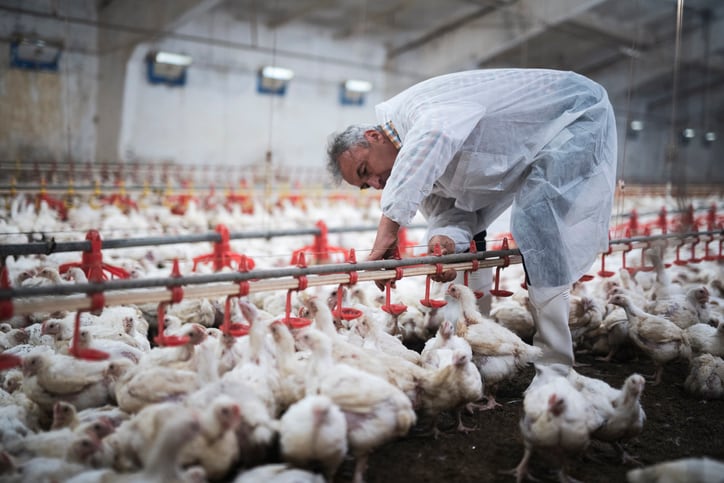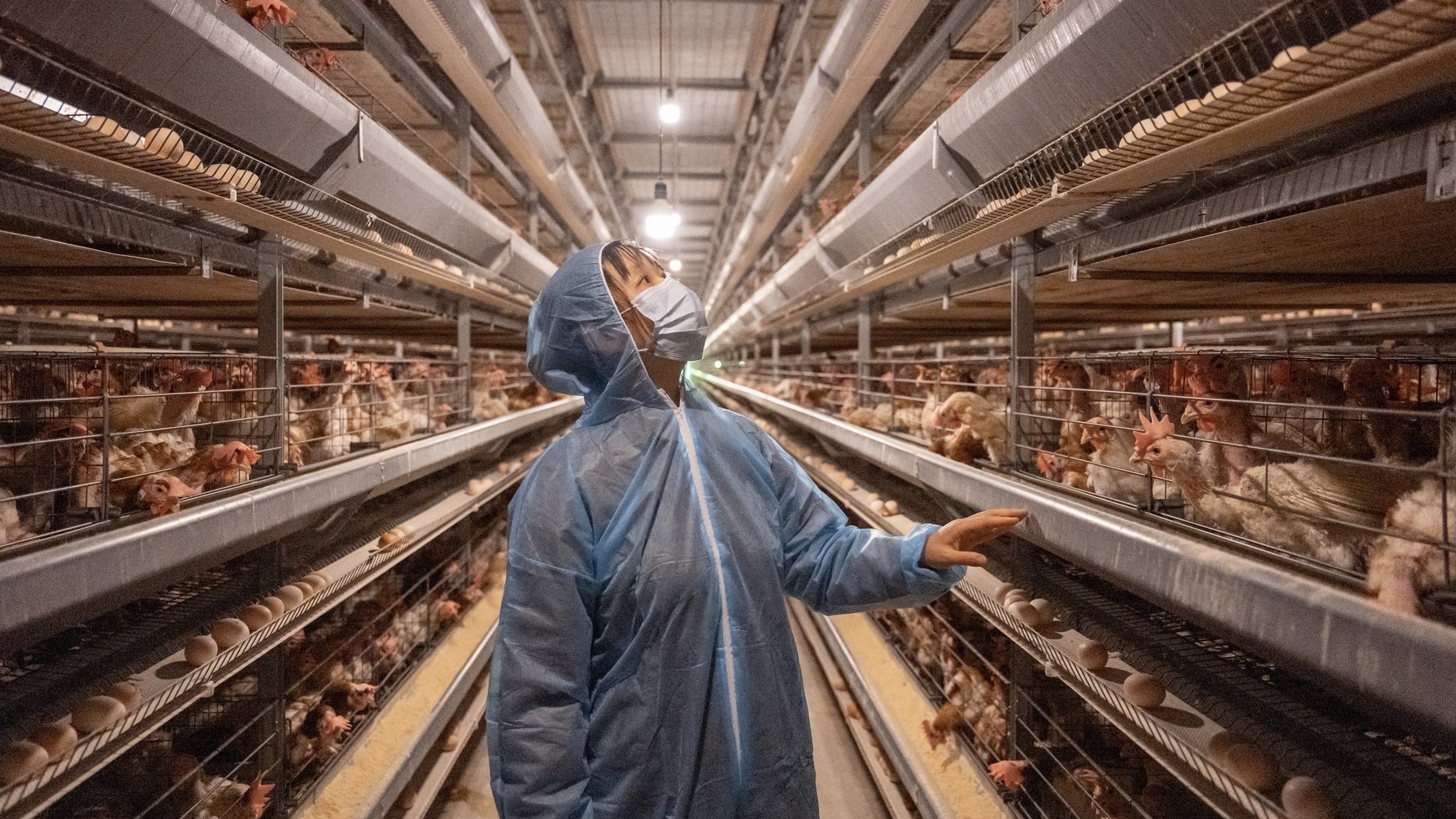The UK-based agtech start-up provides artificial intelligence (AI) tools to help poultry companies forecast harvests and animal welfare, as well as to comply with pre-agreed performance and welfare targets.
Speaking to AgTechNavigator, Montefiori said: “I think farmers aren’t the ones who need to be educated; (rather), it’s the tech providers who need to level up their products and services.”
Implementing new poultry tech was often associated with “creating undue burden” for UK poultry farmers, he explained, who have been effectively asked to change their habits and tried-and-tested techniques by those with less experience in the industry. Additionally, they have tended to end up spending excessive time on troubleshooting faulty hardware devices.
Montefiori also addressed issues with data collection technology, saying that “every wave of farm data collection technology” over the last two decades had failed to achieve widespread adoption due to the hardware being “too fragile and too expensive”.
“Fragile (or unreliable) sensors multiply the complexity of farmers’ lives. Growing poultry is already a tough balancing act. I suspect poultry farmers don’t have the capacity to deal with new, unreliable data sources. One’s own eyes, ears and nose smell are still the most reliable tools in the poultry industry,” he said.
However, he added that since the turn of the century, the UK poultry industry had made “great progress in improving environmental control within sheds via improved cooling and heating systems and so on”.
He also mentioned market-leading poultry flock management software provider MTech Systems, which he said had pioneered the sector’s transition from paper to computer-based data storage and improved data transfer between the different supply chain stakeholders.
Poultry pilot potential
In a ground-breaking move for UK poultry farming, Beakbook has partnered with Avara Foods, the UK’s third-largest poultry grower, for a pioneering pilot project that aims to revolutionise animal welfare through AI. The collaboration is part of Avara's ongoing commitment to enhancing bird welfare and is set to achieve a remarkable 98% accuracy in forecasting without human intervention.
As one of the UK’s largest food businesses, Avara supplies major retailers and restaurants, playing a vital role in the country's food security. The joint pilot project, spanning five months, is funded by Innovate UK's Transformative Technologies Award and aims to introduce AI compliance software to improve welfare and productivity across Avara's poultry supply chain.
The pilot focuses on Beakbook's AI technology, which will predict the body weight of poultry — a crucial factor for supply chain planning. Analysing data from over 400 million chickens, the pilot includes a three-month live trial to compare AI-automated predicted stocking density values with actual recorded stocking density. Success in this endeavour could see Beakbook's AI launched across the UK and Europe in Q2 2024.
Stocking density is a key concern in modern poultry farming to ensure birds have ample space for natural behaviour. Avara, operating under Red Tractor standards, aims to use AI to monitor stocking density accurately, reducing the compliance burden on individual farmers and aligning with international welfare standards.
The introduction of Beakbook's AI is not just about welfare improvements; Avara anticipates productivity gains as well. The transition from manual to autonomous planning is expected to reduce manual data analysis hours by 15%, enhancing the efficiency of planning teams and strengthening the sector's ability to monitor animal welfare.
The pilot aligns with Beakbook’s commitment to digital transformation in agriculture, addressing the lack of analytics options in the market. Montefiori sees predicting crowding levels as the first step in inspiring young entrepreneurs to explore agtech for global food security.
On its part, Avara sees the partnership as an opportunity for continual improvement in bird welfare. In a joint press release, its agtech development officer Samuel Laing said Beakbook's understanding of the poultry sector and cutting-edge technology made them an ideal partner for research and development (R&D) projects.
Beakbook's experience in digital transformation projects emphasises the potential for ethical and sustainable poultry farming. Additionally, the pilot represents a paradigm shift in how the UK monitors and maintains animal welfare, with hopes that other industry players will follow suit in implementing intelligent compliance methods.
Montefiori told ATN: “Our AI technology is used by integrators to improve planning and our AI compliance tools are deployed as a software layer noticeable only to planning and compliance, who in turn receive an enhanced ability to trigger early interventions and control.
“We are imperceptible to farmers; they have the freedom to engage with the technology to whichever extent they prefer. This in turn helps farmers receive a higher and more consistent income for their work. We try to give them more revenue and autonomy (by operating without being noticed).”
Problems and predictions
Acknowledging the gaps in the UK poultry farming industry, Montefiori said digital transformation could lead to improvements in four key areas, one of which being the ability to meet targets (such as chickens being delivered on weight and on time).
The second would be feed allocation, whereby animals would be given customised nutrient profiles based on their real-time growth; this could reduce costs by over 2% and CO2 emissions by 6% (29 million tonnes of CO2 equivalent globally per year).
By leveraging increasing access to historical and predictive performance data, digital transformation could also improve the quality and range of insurance and loans that farmers and integrators are able to access.
Finally, by meticulously measuring each gram of excess, precision farming and AI could ensure a sufficient response from the livestock industry to its own impact on climate change.
Montefiori expects Beakbook’s AI compliance software to result in more accurate farm predictions, which will in turn lead to accelerated transition towards digital transformation in the UK poultry sector. This, he said, would help improve control over farming outcomes and early interventions. “Preliminary analysis suggests our technology will be able to increase the time for interventions from one day to seven days,” he added.
He also expects the software to help the UK become more food-secure “by unlocking new poultry productivity”. Minor fluctuations in external conditions can significantly lower farm productivity; as such, better modelling and encouragement of earlier interventions will allow farms to significantly enhance production consistency and volume.
In addition, as the entire poultry supply chain produces an enormous amount of data and “every single piece is consequential”, he highlighted the importance of Beakbook’s AI compliance tools being able to “unlock a new level of reactivity and precision that will allow real-time processing of big data into actionable steps”. This will reduce the delays and inefficiency caused by the current system.
Before targeting the entire supply chain, however, Beakbook is focusing on optimising how it handles farm data outputs, which will help planners better set thin and clear dates.
Montefiori said, “Improved thin and clear dates lead to more optimal chicken weights, which helps farmers receive more money, processing facilities maintain constant utilisation rates, and keep retailers happy by consistently providing the exact amount ordered. We decided to begin targeting this segment because a large amount of supply chain volatility downstream of farms arises from the variable weights coming off them.”
Apart from crowding levels and chicken weights in poultry farming, Beakbook plans to address other issues related to a systemic lack of analytics options. It is currently building a complete suite of forecasting tools to enhance poultry planning and compliance.
“The benefits of enhanced control and early interventions exist across many other cases. We can’t share too much about the exact use cases yet, unfortunately,” said Montefiori, “but Beakbook will become the facilitator of real-time data flow and data self-awareness within the UK’s poultry supply chain.”




